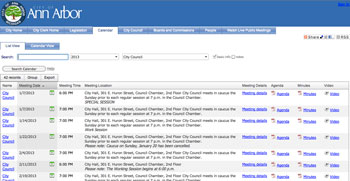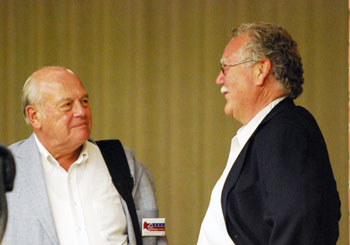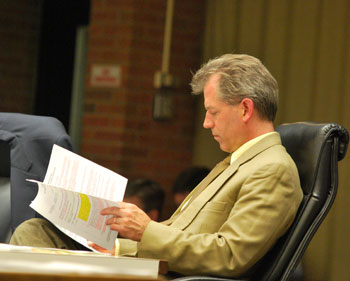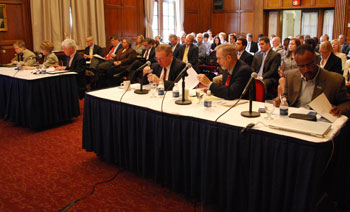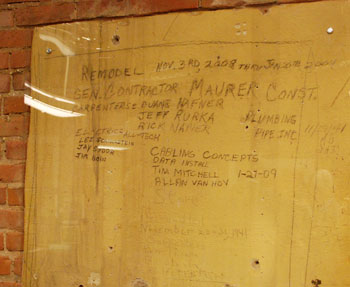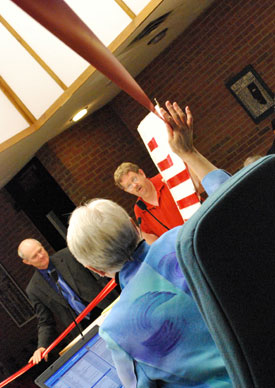Editor’s note: This “Live Updates” coverage of the Ann Arbor city council’s June 16, 2014 meeting includes all the material from an earlier preview article published last week. The intent is to facilitate easier navigation from the live updates section to background material already in this file. Outcomes of council votes are also available in the Civic News Ticker.
The city council’s last meeting of the 2014 fiscal year, on June 16, 2014, features an agenda packed with items related to the city’s physical infrastructure like bridges (including art), the sanitary sewer system and the stormwater system, as well as several resolutions related to construction of new sidewalks.
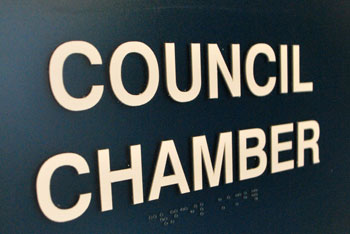
The sign on the door to the Ann Arbor city council chamber includes Braille.
Related to new sidewalk construction is a resolution that would authorize a $75,000 contract with the Greenway Collaborative, to support the work of a pedestrian safety and access task force established by the city council in late 2013. Part of the task force’s responsibility is to create a tool for setting priorities for funding and filling sidewalk gaps in the city.
The $75,000 cost for the pedestrian safety task force consultant is the same amount the council will be asked to allocate to support the work of Ann Arbor SPARK, a local economic development agency. The contract with SPARK is renewed annually, as is another contract on the June 16 agenda – for lobbying services from Governmental Consultant Services Inc. The GCSI contract is for $48,000.
Also on the council’s June 16 agenda are three items with a connection to the Ann Arbor Downtown Development Authority. One is the approval of an end-of-year budget adjustment that was already approved at the DDA board’s June 4, 2014 meeting. Another is approval of a $37,500 expenditure from the city’s affordable housing trust fund to help pay for an affordable housing needs assessment. At its June 4 meeting, the DDA board authorized a $37,500 grant for the same study.
In the final item with a DDA connection, the council will be asked to authorize $69,555 for the conversion of 223 mercury-vapor cobrahead streetlights to LED technology. This project would convert streetlights that are all outside the DDA district. The project is on the city council’s agenda because the DDA board recently declined to fund a similar LED conversion project – for streetlights inside the DDA tax capture district.
Several other June 16 agenda items relate to the downtown area, even if they don’t have an explicit DDA connection. Two of them involve changes to downtown zoning ordinances that have been recommended by the planning commission. The zoning question to be given initial consideration by the council is whether to downzone the southeast corner of William and Main streets from D1 to D2, but with a 100-foot height limit.
Other downtown items on the council’s June 16 agenda include site plan approvals for First Martin’s hotel project at Ashley and Huron, and the Bank of Ann Arbor expansion at Fifth Avenue and Washington Street.
A resolution to improve Liberty Plaza, a downtown park at the southwest corner of Division and Liberty streets, also appears on the agenda – sponsored by mayor John Hieftje and Christopher Taylor (Ward 3). Added as sponsors since its initial appearance on the agenda are Sabra Briere (Ward 1) and Margie Teall (Ward 4).
The council will be asked to approve four items related to supportive services for the criminal justice system: (1) a $76,242 contract with Washtenaw County Community Support & Treatment Services for mental health treatment services for the 15th District Court’s sobriety and mental health courts; (2) a $44,200 contract with the Washtenaw County sheriff’s office to provide drug abuse screening and monitoring services for the mental health court; (3) a $108,174 contract with Dawn Farm for drug abuse counseling and rehabilitative services; and (4) a $40,000 contract with Reiser and Frushour PLLC to provide legal representation as court-appointed counsel to indigent defendants.
Recycling is the final topic with multiple items on the June 16 agenda. The council will be asked to approve funds for a $95,694 contract with Recycle Ann Arbor to create a multi-family recycling incentive pilot program. The council will also be asked to approve $39,480 to reimburse the city’s operator of its materials recovery facility for repair of a conveyor that feeds the baler. And finally, the council will be asked to approve $35,000 for Recycle Ann Arbor to provide solid waste services associated with student move-out activity.
The June 16 council meeting will also feature the annual historic district commission awards and the introduction of one of the Ann Arbor police department’s K-9 units, who won highest honors at a recent national certification trials event. This article includes a more detailed preview of many of these agenda items.
More details on other agenda items are available on the city’s online Legistar system. The meeting proceedings can be followed Monday evening live on Channel 16, streamed online by Community Television Network starting at 7 p.m.
The Chronicle will be filing live updates from city council chambers during the meeting, published in this article below the preview material. Click here to skip the preview section and go directly to the live updates. The meeting is scheduled to start at 7 p.m. [Full Story]





